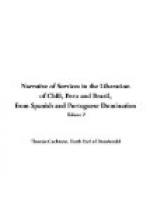and high consideration since August 20th, 1820.
I have to complain of the style of your Excellency’s Secretary, who, perhaps from his ignorance of the idiom of the Spanish language, cannot express himself with decency—his soul not having been formed to conceive correct ideas.
MONTEAGUDO.
The complaining tone of this letter about the “valiant sacrificing all,” is worthy of the writer; when I had left untouched many times the amount seized, and the army, according to the admission of the Protectoral Government, had received two-thirds of its pay, whilst the squadron had even been suffered to starve. On the 28th I replied to the Minister as follows:—
Sir,
I should have felt uneasy, had the letter you addressed to me contained the commands of the Protector to quit the ports of Peru without reason assigned, and I should have been distressed had his motives been founded in reason, or on facts; but finding the order based on the groundless imputation that I had declined to do what I had no power to effect, I console myself that the Protector will ultimately be satisfied that no blame rests on me. At all events, I have the gratification of a mind unconscious of wrong, and gladdened by the cheering conviction that, however facts may be distorted by sycophancy, men who view things in their proper colours will do me the justice I deserve.
You address me as though I required to be convinced of your good intentions. No, Sir, it is the seamen who want convincing, for it is they who put no faith in professions so often broken. They are men of few words and decisive acts, and say that “for their labour they have a right to pay and food, and will work no longer than they are paid and fed”—though this may be uncourtly language, unfit for the ear of high authority. They urge, moreover, that they have had no pay whatever, whilst their fellow-labourers, the soldiers, have had two-thirds of their wages; they were starved, or living on stinking charqui, whilst the troops were wholly fed on beef and mutton; they had no grog, whilst the troops had money to obtain that favourite beverage, and anything else they desired. Such, Sir, are the rough grounds on which an English seaman founds his opinions. He expects an equivalent for the fulfilment of his contract, which, on his part, is performed with fidelity; but, if his rights are withheld, he is as boisterous as the element on which he lives. It is of no use, therefore, to convince me, but them.
In what communication, Sir, have I insisted on the payment of 200,000 dollars. I sent you an account of money due, but told you in my letter that it was the mutinous seamen who demanded the disbursements, and that I was doing all in my power, though without effect, to restrain their violence and allay their fears. You tell me in your letter that it was impossible to pay the clamorous




